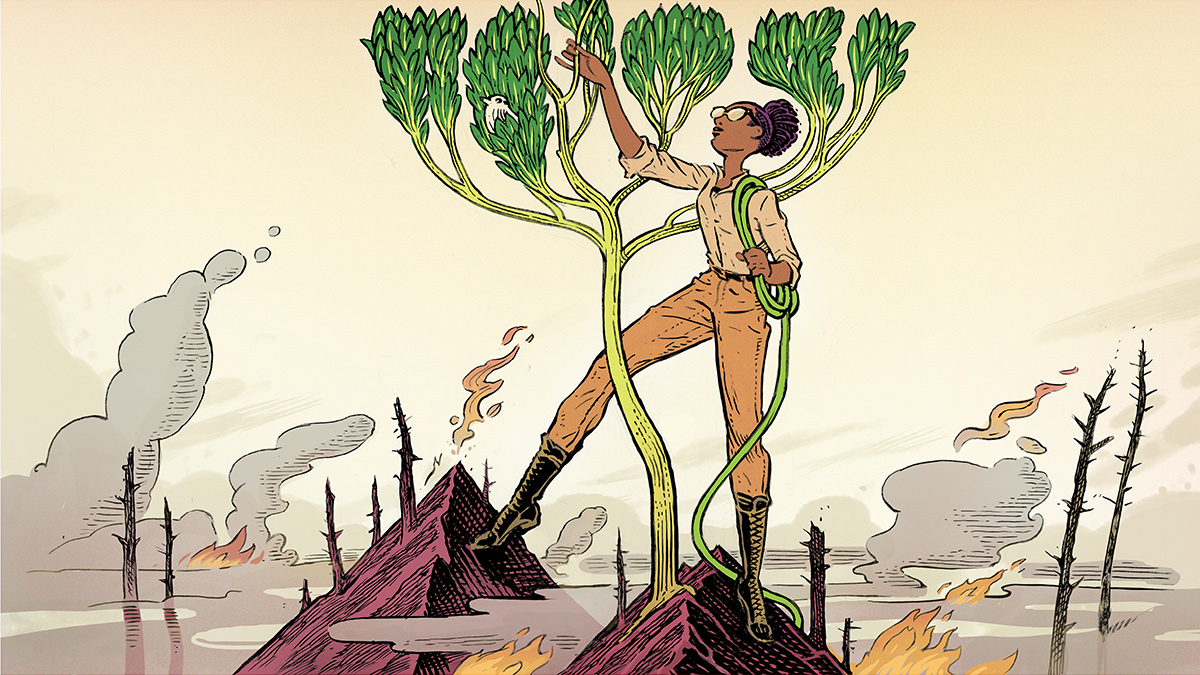
How to promoting the inclusion and leadership of women in climate action?
Gender equality impedes human development, preventing half of the population from participating in social, political and economic life. Pakistan ranked 145 out of 146 countries on gender parity in 2022 (World Economic Forum 2022). Given the multiple forms of deep-rooted discrimination, women are more vulnerable than men because they depend on scarce natural resources to support their families and communities. Women are also more likely to live in poverty.
Women play a significant role in combating the adverse effects of climate change. They manage the natural environment, produce food, and contribute to improve the quality of life in their communities. It is important to support initiatives that highlight the need for inclusion and leadership of women in climate action.
The Gender and Climate Award is in line with the gender policy objectives of the National Climate Change Policy of the Government of Pakistan (October 2021). It is also a concrete follow up to the launch by IUCN and the Ministry of Climate Change (MoCC) of the Climate Change Gender Action Plan (ccGAP) (July 2022). The ccGAP supports inclusive policy dialogue, capacity development, and pilot projects for women by focusing on recognizing gender equality as a core principle, and inclusion of women in local and national level policy program and design. It emphasizes the need to increase the integration of gender considerations—such as addressing women’s specific vulnerability to natural disasters, understanding women’s role in agriculture and food production, and supporting women entrepreneurs in the energy and transportation sectors—as well as to increase climate-related resources that integrate gender priorities and reflect the needs of women and girls.
Objective of the Gender and Climate Awards
To highlight the central contribution of women in the fight for the climate and the need to integrate gender equality in all policies resulting from the Paris Agreement. The award will draw attention to good practices and concrete solutions led by women from civil society for a more fair, equal and healthy planet. This project responds to the Paris Agreement’s objective of promoting gender equity and justice, and youth engagement, in climate action. The Award will recognize initiatives, projects and solutions with women or gender perspectives.
Thematic areas covered by the Awards
1. Agroecology, agroforestry, family farming and sustainable fisheries: sustainable and resilient agricultural systems, allowing women to improve their production, nutrition and reduce their workload, to be more autonomous within their household and community (preservation/restoration of soils, land and marine ecosystems; increasing adaptation and resilience to the effects of climate change (traditional seeds, crop diversification, livestock-crop association, improved sustainable agricultural, fisheries and livestock practices).
2. Rural development and women’s empowerment: access to and control of productive resources and land, access to infrastructure and services (e.g. economic services provided by professional agricultural organisations, advice, training, veterinary services). Access to finance, entrepreneurial development, participation in the governance of local committees or cooperatives.
3. Sustainable management of natural resources and biodiversity: preservation of resources, integrated management of natural resources, biodiversity, forest conservation, conservation of marine and freshwater ecosystems, fight against desertification.
4. Water and sanitation: access to water, integrated water resources management, taking into account the increase in women’s domestic responsibilities due to the impacts of climate change, setting up inclusive and eco-responsible sanitation facilities, participation of women in water management of services or in the water sector’s decision-making bodies.
5. Energy and waste: energy efficiency, renewable energy, transport, waste management and recovery.
6. Climate risk prevention and disaster management: inclusive access to information on climate risk and disaster management, participation of women in DRM decision-making bodies, taking into account women’s mobility restrictions, and women’s increased exposure to post-disaster gender-based violence, national and local climate risk prevention and management programmes including gender issues (gender-sensitive prevention, insurance systems, post-disaster reconstruction programmes (income-generating activities for women), taking into account the specific challenges of emergency shelter camps (location of sanitary facilities, separation of women and men, security).
7. Governance and advocacy: participation of women in national and international advocacy campaigns (including with youth), improving governance bodies (technical committees, trade unions, etc.) for adopting climate-smart and gender-responsive initiatives, promoting the use of technology to support climate objectives, and ensuring gender proofing of the climate change-related policies and programmes.
Article link – https://www.iucn.org/Gender%20and%20Climate%20Awards
